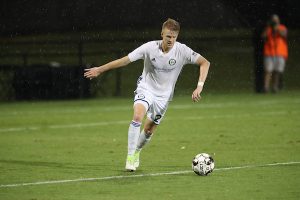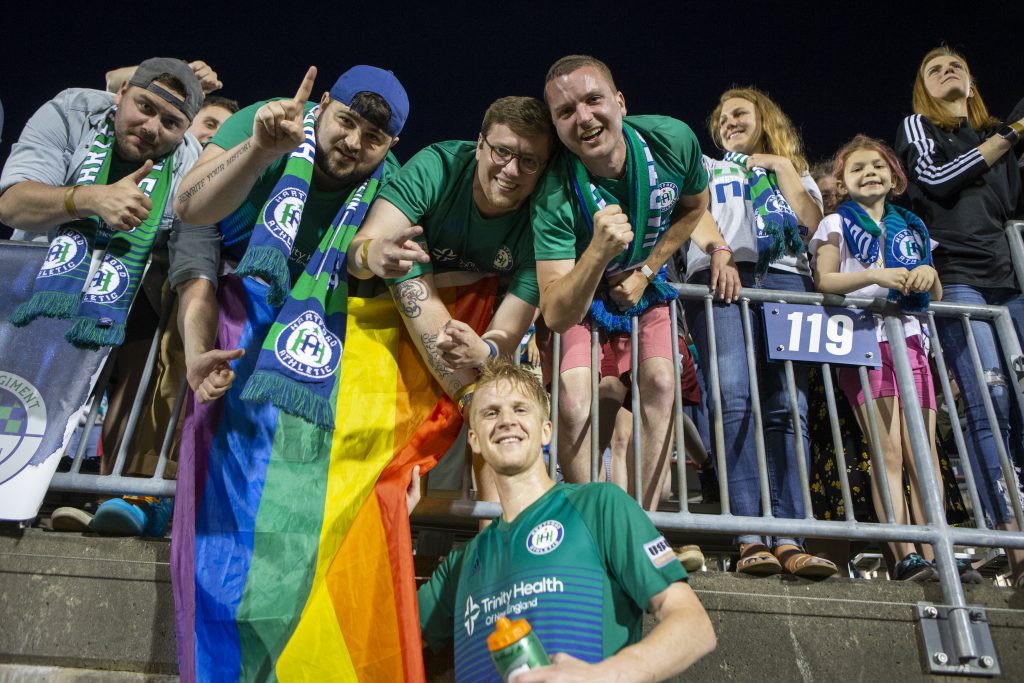With the US women’s national team’s monumental World Cup victory, and the rising celebrity of lesbian player Megan Rapinoe, it’s clear to everyone: soccer is as queer as ever! “You want us to be role models for your kids,” Rapinoe told the New York Times, responding to the critique that soccer players shouldn’t stand up for LGBT rights. “It’s like, we’re not just here to sit in the glass case for you to look at…You will not steal our joy from us as a team, as the L.G.B.T.Q. community.”
Soccer players around the country are taking a stand—and Hartford Athletic defender Kyle Curinga is at the forefront of this movement. Curinga has joined over one hundred soccer players around the United States in the global charity movement Playing for Pride. Launched by North Carolina player Austin da Luz in June 2017, Playing for Pride has driven the soccer community to express its support for LGBT rights, and in the process has raised over $20,000 for LGBT charities.
We spoke with Curinga about the soccer world, queer allyship, and his favorite part of Hartford, Connecticut.
CT VOICE: Playing for Pride is a global movement in which individual players work to raise upwards of $20,000 for LGBT charity initiatives. What have you done? Have you reached your goals, are you looking to raise more money?
Kyle Curinga: Playing for Pride has been around for a couple of years. I got involved last year for the first time, and this has been my second year. It’s different for every player. For example, if you score a goal, you’ll earn X amount of dollars. If you assist a goal, you’ll earn Y amount of dollars. If you play in a game, you earn Z amount of dollars. We do it like that, and then we share it on social media, spread the message and get people involved. I’ve had support from friends, family, from both of the clubs I’ve played for.
CT VOICE: We love to see people coming together for a great cause. If you had one thing to say to LGBT athletes who feel under-represented, what would you tell them?
K: I can’t speak from personal experience, but honestly, I think you should be open with yourself. Last month A young player sent me a message sharing an upsetting story about their parents not being accepting of their sexuality. That’s a tough position, when the people who love you the most won’t support you. I can only imagine how tough that is, but understand that you will be okay, and that you need to keep moving forward.

CT VOICE: As an athlete of the United Soccer League, what motivated you to express your allyship for the LGBT community?
K: Sports can sometimes be a toxic environment. Growing up in sports, I’ve seen that firsthand. It’s a small faction of people who make inappropriate remarks or are immature, and they don’t fully understand the things they say. But I’ve seen how this affects my LGBT teammates, and so I felt that I needed to take a stand. I really wanted to join a movement that promotes equality for athletes, and for people in general.
CT VOICE: When you encounter homophobic/ignorant remarks in sports, how do you as a teammate take a stand?
K: I used to just ignore it, I guess. I don’t think that’s the best way to address it, but at first that’s how I went about it. But the older I got, the more mature I got, and the more comfortable I got with saying, Hey, you shouldn’t be saying that. It’s never okay to use homophobic language when you’re on the field, when you’re practicing.
CT VOICE: You’ve been playing soccer professionally for about six years, and you’ve played in Florida, Finland, and now Connecticut. How are you liking Hartford? Is there anything about Connecticut you think is unique from everywhere else?
K: It’s always different coming to a new place, because you’re always like, “Oh, this is not great, I don’t feel at home here.” But as you get more accustomed to the lay of the land, you learn the cool things to do. So now I’m hitting my stride.
I love pizza, so I’ve had some of the best pizza of my life in New Haven.









More Stories
Nutmeg State FCU sets its sights on the Future
Friendly Competition
Life in the Fast Lane